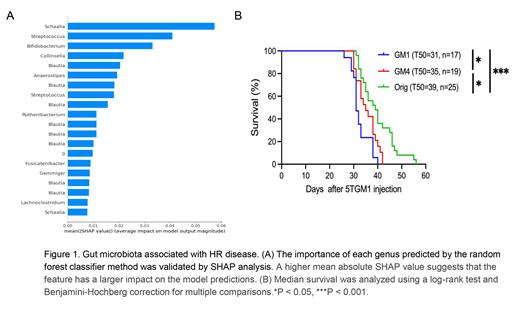Background: High-dose melphalan conditioning followed by autologous stem cell transplantation (ASCT) is standard therapy for newly diagnosed multiple myeloma (MM) patients with standard-risk (SR) or high-HR disease. Despite significant improvements in the depth of response by induction therapy prior to ASCT and consolidation and maintenance therapy post-ASCT, most MM patients with HR cytogenetics relapse quickly post-ASCT with a median PFS ranging between 1 and 2 years. It remains unclear as to why patients identified as relapse earlier than those with SR disease (SR). We ask whether the variability in outcome is due to differences in the diversity and composition of the gut microbiome given its role as a predictor and modulator of tumorigenesis, anti-tumor immunity and response to therapy. Two preclinical studies have shown progression of MM is accelerated by a T H17-associated gut commensal (Calcinotto et al. Nat Commun, 2018) and nitrogen-cycling bacteria (Zhu et al. Microbiome, 2020). In MM patients, lower peri-engraftment diversity predicted inferior outcomes after ASCT (Khan et al. Blood, 2021) and sustained minimal residual disease-negativity was associated with butyrate-producing bacteria and plant-based diets (Shah et al. Clin Cancer Res, 2022). In this study, we analyzed the association between gut microbiota and HR cytogenetic features in MM patients in the ASCT setting. We also determined the cause-and-effect relationship between gut microbiota and disease progression in the 5TGM1 mouse model.
Methods and Results: We prospectively collected stool samples from 55 MM patients at time of melphalan conditioning (pre-ASCT), engraftment (72hrs of absolute neutrophil count ≥ 500/mcL), and 60-120 days post-ASCT. The median age of patients (35 males, 20 females) was 63.1 (range 45.6-77.2) years. After a median follow-up of 54 months (range 1-81), the median PFS of patients was 37 months (range 1- 76). We profiled the gut microbiome of SR (n=29) and HR (n=26) MM patients using 16S rRNA sequencing of the V4-V5 region. Amplicon sequence variants (ASV) were annotated against the NCBI 16S database using BLAST. We chose to identify gut microbiota features associated with HR cytogenetics in samples during peri-engraftment when microbial dysbiosis and impaired immune function is most pronounced. The alpha diversity was higher in HR patients using Inverse Diversity index (p<0.020). However, we did not observe significant differences in beta-diversity between groups. Random forest prediction classifier method and Shapley Additive exPlanations (SHAP), a post-hoc explainability algorithm identified Schaalia, Streptococcus, Bifidobacterium with the highest variable of importance (Fig. 1A) These findings were further validated by linear discriminant analysis of effect size (LEfSe). To establish causality, we generated two isogenic C57BL/KaLwRij strains that harbor differences in the complexity and richness of naturally occurring gut microbiota, using complex microbiota targeted rederivation. We observed significant baseline differences in richness (p<0.001), β-diversity (Bray Curtis, p=0.0001), hierarchical clustering and relative abundance among GM1 (low richness), GM4 (intermediate richness) and our original (Orig) GM strain (high richness) bred in our vivarium. The median overall survival for MM-bearing GM1, GM4 Orig GM mice were 31, 35 and 39 days post-5TGM1 transplantation (Fig. 1B).
Conclusions: These studies suggest that distinct gut microbiota signatures are associated with HR and SR disease. Furthermore, our preclinical findings suggest a causal relationship between gut microbiota and severity of disease further highlighting the influence of the gut microbiome on progression of disease. Taken together, these findings provide the rationale for microbiota-centered interventions to improve immune-mediated control of MM and overturn resistance to therapy.
Disclosures
Feinman:BMS: Other: Spouse; Takeda: Other: Spouse; COTA: Other: Spouse; Pepticom: Other: Spouse; Sanofi: Other: Spouse; GSK: Other: Spouse; Karyopharm: Other: Spouse; Pfizer: Other: Spouse; Janssen Onocology: Other: Spouse; Menarini Silicon Biosystems: Other: Spouse; Neximmune: Other: Spouse. Biran:Boehringer Ingelheim: Other: spouse of employee; Janssen: Honoraria, Membership on an entity's Board of Directors or advisory committees, Research Funding; Pfizer: Membership on an entity's Board of Directors or advisory committees; GSK: Membership on an entity's Board of Directors or advisory committees; Genomic Testing Cooperative: Divested equity in a private or publicly-traded company in the past 24 months; Abbvie: Honoraria; Takeda: Honoraria, Membership on an entity's Board of Directors or advisory committees; Sanofi: Honoraria, Membership on an entity's Board of Directors or advisory committees; Merck: Research Funding; BMS: Honoraria, Membership on an entity's Board of Directors or advisory committees, Research Funding; Karyopharm: Membership on an entity's Board of Directors or advisory committees, Research Funding; Amgen: Membership on an entity's Board of Directors or advisory committees, Research Funding. Siegel:BMS: Consultancy, Honoraria, Membership on an entity's Board of Directors or advisory committees, Research Funding, Speakers Bureau; Celgene: Consultancy, Honoraria, Membership on an entity's Board of Directors or advisory committees, Research Funding, Speakers Bureau; Amgen: Consultancy, Honoraria, Membership on an entity's Board of Directors or advisory committees, Research Funding, Speakers Bureau; Takeda: Consultancy, Honoraria, Membership on an entity's Board of Directors or advisory committees, Research Funding, Speakers Bureau; Janssen: Consultancy, Honoraria, Membership on an entity's Board of Directors or advisory committees, Research Funding, Speakers Bureau; Celularity Scientific: Consultancy, Membership on an entity's Board of Directors or advisory committees; Karyopharm: Consultancy, Honoraria, Membership on an entity's Board of Directors or advisory committees, Research Funding, Speakers Bureau; Novartis: Consultancy, Honoraria, Membership on an entity's Board of Directors or advisory committees, Research Funding, Speakers Bureau.


This feature is available to Subscribers Only
Sign In or Create an Account Close Modal